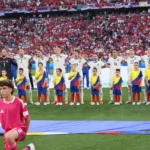UEFA | GENERAL SECRETARIES MEETING IN ENGELBERG

Who scored the most goals in one final tournament of the European Championship: How many goals in play were scored in total, and how many were scored from the penalty mark? These were just some of the quiz questions that served as an interesting prelude to much more serious topics at the meeting of the UEFA national association general secretaries, organized in the Swiss town of Engelberg last week.
“When we talk about goals, Cristiano Ronaldo is on everyone’s mind because he has played in the most final tournaments (5) and is the only player who managed to score in four championships. The Portuguese is the absolute record holder with 14 goals scored, but Michel Platini is above the top when it comes to goals in one European Championship. In 1984, he scored 9 goals in France, and he is also one of the seven players who scored a hat-trick in a match against our national team”, says Jovan Šurbatović, who represented FA of Serbia at the meeting hosted by UEFA General Secretary Theodore Theodoridis and National Associations Director Zoran Laković.
They mostly talked about the upcoming European Championship, to be held in Germany from 14th June to 14th July.
“We expect three million fans to arrive, it is estimated that in one month around 12 million people will visit the fan zones in ten cities hosting the final tournament. The total revenue should be 2,4 billion euros. If you bear in mind that in Sweden in 1992 that figure was only 40 million euros and at the previous one in 2021 it was around 1.9 billion euros, this will be the most profitable championship of all time. The experience the Germans have in organizing major sports events, and the fact that the matches will be played in the same cities as at the World Cup in 2006, leave no doubt that this will be the best organized championship in the history of European football.”

Media and commercial rights have long been sold out, and significant income is expected from ticket sales, with the third and final phase scheduled to be in March and April this year.
“Tickets are a special part of the story. Fans are far more interested in tickets than the available contingents offer. The first phase began in October last year, the second lasted during December 2023 and January 2024, two million tickets were sold, and the remaining 700,000 will be available during the last phase of the sale, in March and April this year. What’s interesting is that the ticket prices for the group stage matches range from 30 to 200 euros, except for the opening match between Germany and Scotland, with the tickets being significantly more expensive (from 50 to 600 euros). The same is with the knock-out phase, ticket prices increase as the tournament draws to the finals in Berlin, where the cheapest seats will be 95, and the most expensive 1.000 euros”, reports Šurbatović.
Ticket prices do not affect the fans’ interest and the proof for it is the fact that the highest demand is for the final match of the European Championship on 14th July.
“Almost 2.3 million fans want to attend the match at the Berlin stadium, when the new European champion is decided. The second place holds the match Germany-Scotland, for which 1.4 million tickets are required. Interestingly, the “most wanted” group stage match is the Frankfurt duel between Germany and Switzerland, with the similar number of tickets required as for the semi-final match in Munich (around one million). It is logical that the greatest interest is among fans from the host country, followed by the English, then the French, Spanish and Austrians. As for football fans from other continents, most ticket requests are from the USA, Canada, Australia, China, and Mexico.”

For the fans of our national team, as well as for all others, UEFA allocated 10.000 tickets for each game (30.000 in total). The sale was through the UEFA Portal, with the inevitable lottery, because about 30.000 applications were received for each match of the team of Serbia.
“UEFA wants to ensure that there are no empty seats in any stadium during the tournament. Therefore, in the third ticket sale phase that will start in March this year, fans will have the opportunity to offer purchased tickets for resale on the official UEFA EURO 2024 platform. This platform eliminates the risk of acquiring invalid or fake tickets and ensures that the ones selling tickets get their money in full, as well as for a valid ticket to reach another true fan at a nominal price. All tickets will be distributed via the official UEFA mobile app that will generate a unique QR code for each ticket. This is certainly bad news for ticket collectors, but the most efficient way possible to avoid misuse and for the tickets to end up in the hands of real fans.”
UEFA Deputy General Secretary Giorgio Marchetti spoke about the evolution that UEFA competitions have undergone in the last ten years.
“The main goal of the new formats is to meet the needs of national associations and clubs and to offer them the most modern competitions in every domain. The first step was media rights centralization in 2014 as it laid the foundations and accelerated the prosperity of football as a global phenomenon. Shortly after that, the final tournaments of the European championships were expanded to a larger number of participants (men to 24, women to 16, U21 teams to 12, then 16, futsal to 16), new futsal competitions were introduced, matches for the world champion between the current champions of Europe and South America, and new format of Nations League that started in 2018 turned out to be a total success, said Šurbatović and pointed out that during the meeting our FA was singled out on several occasions as a positive example, above all when it comes to sales and distribution of TV rights and cooperation with UEFA in this matter.

A particularly interesting part of the meeting in Engelberg referred to the report of the UEFA Referees’ Committee Chairman Roberto Rosetti on the experiences and benefits of the VAR technology.
“We watched and remembered some examples from the past when referee mistakes had affected the outcome of some very important matches. Specifically, Geoff Hurst’s goal that helped England win their only World Cup title in 1966 and Thierry Henry’s famous hand in the match France – Republic of Ireland in the 2010 World Cup play-offs. Today football is a business and a serious industry, it is in no one’s interest to lose a match because of one referee’s mistake. VAR certainly contributed to making the football game cleaner and fairer, but far from that, the human factor is losing its importance. Match referee is still the one with the final say and who makes decisions on the pitch. Rosetti emphasized that the technology served exclusively to avoid and eliminate clear and obvious mistakes and additional improvement would be worked on in the future.”
The hosts of the meeting, Theodore Theodoridis and Zoran Laković, thanked the participants on the constructive discussion and pointed out the importance of working together to improve European football. They agreed to continue with the work on the implementation of the proposed measures and monitoring of new trends in order to maintain a high standard of football competitions in Europe.




